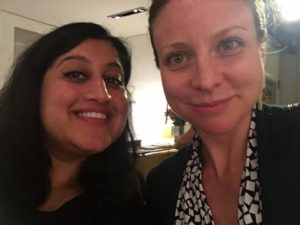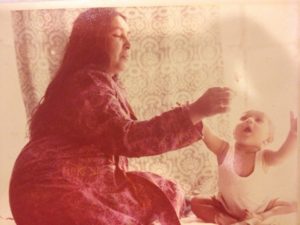Theatre at its most basic is storytelling. The root of all good performance comes from the inherent ability to tell the story in its simplest form. All the whizzbangery and whistles of spectacle that accompany theatrical endeavors are an added bonus, but if you can’t tell a story at its core, you’re wasting everyone’s time including your own. Proving her prowess as an engaging storyteller, performance artist Ritija Gupta has taken a moment to sit with TheatreBloom for an exclusive interview to talk about her current show— Charming the Destroyer: Questionable Choices in the Search for the Sublime— now running as a part of the Mead Theatre Lab Program at Cultural DC.
Thank you for taking a minute to sit with us! How did you end up with the Mead Theatre Lab Program?

Ritija: Story District used to be Speak Easy DC. Back in March of 2013 I applied to do a first-time storytelling opportunity. They encourage first-timers. I got into a show called Lent. Stephanie Chapman Garibaldi, who is actually the director for this show, is one of the main coaches at what used to be Speak Easy DC. She meets with all the storytellers, does her run-through of the idea of the show, and gets the best out of each storyteller. I loved that experience. What’s funny is, which I didn’t remember until just now, but originally my story was just going to be about my pilgrimage to India. I had worked on the story but as I was going through it— literally the night before I was supposed to perform— I called Stephanie and I said, “I just feel like this story isn’t coming together.”
Even though the theme of the show was Lent, it was stories about religion and faith, and I did want to do a story about religion and faith but I felt that what I had just wasn’t it. I asked her could I do something else that was pretty much baked. She told me that if I wanted to switch it and if I felt that I had a story in me that that was fine. The story that I had was the one that I share in the performance, with Saddam Hussein and working for the lobbyist. Stephanie didn’t really get to hear the story because I only had a few of the beats, it wasn’t entirely fleshed out. I went on the stage and basically told the thing entirely extemporaneously. I remember when I got off stage I felt like I had had a blackout, I couldn’t remember anything I had said. But apparently the audience really liked it; I got a great response.
At the end of the year, that story— my first one that I had ever told at Story District— was nominated for “Best of.” It was a really auspicious beginning. I had gotten a couple of other opportunities to tell stories that year. There was a special series called “Atonement” at the DC Jewish Community Center. I also got to tell a story at the Potomac River Running Club about outdoor activities and I talked about my first triathlon. I got all of these opportunities to get on stage and I was getting addicted. Over the last year, because work has been completely insane, I didn’t get a lot of stage time. But then I went down to Charleston and had that moving experience in the church— which I talk about in the show— the next day I called Stephanie, because she’d directed a number of one-person storytelling shows. I told her this was something that I thought I could do, that I felt really passionate about, and so I asked her what did I need to do to get into Fringe?
She had suggested that although Fringe was fine for these types of performances that there would be a lot of logistical challenges and that it might feel very competitive because there were all these other shows going on and everyone has to self-promote to really have their voice heard there. I’m not a very competitive person. I’m also not a very organized person. She told me about this other program, the Mead Theater Lab out of Cultural DC, and suggested that it might be a better fit for me. I looked it up, it looked really cool, and they looked like they gave the artists a lot of support. Stephanie very kindly offered to write my recommendation. It was very sweet of her.

The show that I came up with was a story of looking at religion through the lens of being an outsider. Then I had an interview with the panel back in January, met some really interesting people along the way from Woolly Mammoth Theatre Company and other area theatre companies, and then in February they told me I had gotten the show. When I got the email, I actually thought it was a very polite brush-off, like one of those, “Thank you for your time, but…” and instead it was an acceptance letter. It was unbelievable. For the first time in my life I considered myself part of an artist community. It was a huge moment and I’m actually still absorbing it.
It’s awesome that area theatre companies are coming together to take part in supporting this artist community.
Ritija: Absolutely. I think that’s actually a huge point and I don’t want to gloss that over. Storytelling can be insular. You’re taking a lot of your thoughts and unless you have a cabal of people that you trust, it is you in your own echo chamber. The fact that there are all these people in this program that you can bounce all of these ideas off of is really awesome and I really appreciate that a lot. Theatre and storytelling are— they’re not different— but you can do storytelling without a theatre. Having to leverage that space in a sense has been really challenging so I really appreciate having people I can go back to for that challenge.
What is it that made you want to get into storytelling?
Ritija: I say this half-jokingly, but my stories in real life that I just tell to my friends tend to be seven or eight minutes long anyway. And my friends politely say to me, “Oh, you should do stand-up.” I think that’s their nice way of saying, “Oh, we’re just trying to have brunch here, can you save this for another time?” I don’t think they want to be me audience. Now, of course, I think that is the point of brunch, you know? It’s “Girl, let me tell you…” time. I think that there is something to feeling like I have all of these weird things that have happened to me, or things that happen to me that actually aren’t weird that people don’t realize are pretty universal.
Can you give us an example? Maybe one from your show?
Ritija: Sure. Let’s take the church story in South Carolina. The thing with the Charleston experience that was so moving for me was that not many people I know have been to a historically black church. There’s not a lot of reason for them to go and pursue one. I’m so glad I went, and I went completely by accident, but it was the most connected I had felt to human beings in a really long time. That’s something that I think anybody could feel. Given how much of an outsider I was in that situation, the fact that I could go in and just embrace it was a testament. In all of my stories, I’m almost never the hero. I’m sort of the person who flubs her way into something interesting. It’s usually something I think other people can relate to.
Your story is very relatable and I think you find a really nice way of balancing that so that people can access it and relate to it.
Ritija: Thank you so much for saying that. I think that is one of the things that I do struggle with as a storyteller. There are a lot of people who tell stories and when I listen to them I’m sort of bowled over by how funny they are and how electric the stories are. They have these great beats and these great builds and I don’t really have that. My stories tend to sound very different every time I tell them. On one hand, I’m telling a story. On the other hand, I’m remembering things. My memory in the present then effects how I say things. That’s something I want to work on because I like to give the audience something consistent to expect. But I also feel like the real connection is there because the emotion is there every time I’m talking because it’s happening in real time for me. When those beats or those builds happen, they happen almost by accident. My whole life is like an accident. I constantly feel like I’m failing upwards. I have no idea why I have certain things that I have.
I think there is an obligation for people who are very lucky to acknowledge that. I’m so pampered and privileged, it’s ridiculous. I would be a legitimately bad person if I didn’t acknowledge my privilege. I was talking to somebody about the fact that I get to have a very right-brained experience with the Mead Theatre Lab and a very left-brain experience with my job. There’s some overlap, which is great because both of them require a lot of organization. There is a level of creativity required when it comes to making something from nothing and I’m privileged enough to get that in both of these parts of my life. That is a part of that luck that I experience amid all of this failing upward.

It’s funny because as I was listening to the video I have where I’m talking with my grandmother about my horoscope, and she had said that the astrologer had said I was going to be a very lucky girl. That’s such an “out-there” thing to say, because you can say that about basically anybody and how do you disprove that? But I feel like I’ve really earned very little. So much of that is because I’ve had a lot handed to me. If there’s something about me that’s good, I think it’s that I’m extremely aware of my privilege and I try to be a very good daughter on Mother’s Day.
Can you tell us where this tremendously huge title came from?
Ritija: Oh my God, it is a huge title, right? I was really struggling with titles and originally the title was You Get Me Closer to God. It sounds a little like a Norah Roberts’ read, but if you grew up with Nine Inch Nails, it’s also a line from the song “Closer.” It wasn’t that I wanted to be that tongue in cheek or that irreverent, because I do like that title— the idea is very literally about other people getting me closer to God. But in talking to other people, I discovered there was a real salaciousness to that title. “Oh, what’s the show going to be about?” I didn’t want people to come in thinking it was going to be a sexy, hot show and it only end up being about faith.
I decided it couldn’t be You Get Me Closer to God. It had to be something else. I’m really into music, so I started thinking about song lyrics. Another song lyric I was thinking about was “I Love Your Precious Heart”, which also sounds like a Norah Roberts’ title, because apparently that’s the domain I play in. My director said “Um, I get where you’re coming from…but…maybe rethink it…” So I did. Then I was just thinking about what is the nexus of these stories? It’s really about Shiva. It’s really about the God I’m supposed to appeal to. What am I really doing? I mean the idea of wearing a yellow dress to entice a God to help you? To me, that seems a little seductive. That creates a really interesting relationship between a faithful person and their deity. That’s how I came up with Charming the Destroyer. I thought the words were kind of juxtaposed in an interesting way and that no one would question it.
That long add-on of Questionable Choices in the Search for the Sublime, that came about because I felt like there really needed to be some context. Charming the Destroyer doesn’t mean anything to people who don’t know that Shiva is considered The Destroyer. It is a long title, but I needed a way to tell people the show was about bad choices and faith.
Bad choices? Or choices that have put you where you are now? When people say bad choices it comes with a certain connotation.
Ritija: That’s a good point. So maybe not bad choices. But I think it’s because I look at those choices— I don’t know this is hard to articulate. I think there is some kind of appeal to being on a particularly linear path that you can explain back to people. There is a lot of comfort in saying to people “I’m straight” or “I’m gay” whereas bisexuality tends to be a little confusing for people still. I think there’s comfort in being in one area of a binary. I’m Christian or I’m Atheist. We have this great defined identity of “I am…” whatever it is that we are. I feel like that’s one of the things I really struggle with. I think it’s because I’ve been given so many options that it’s challenging for people to figure out where I am with it. Like with the fasting story, if I’m going to a temple in the middle of the day, but I’m not really a Hindu, is work really going to allow me to do that? I mean they do need to allow me to express my religious freedom. But is that religious freedom because that’s not really my religion. That’s one of the things I’ve grappled with. What am I allowed to lay claim to if I’m not going to be devoted?
What would you say has been your struggle in coming together as someone who isn’t necessarily on the ‘artist path’ who is now setting out to do a solo performance-based storytelling show?
Ritija: So many struggles. I think the biggest struggle, and I’ve been thinking about it a lot, but when I normally do a story there’s a bit of an echo chamber. Especially with a shorter story, I feel like you can repeat it over and over again to yourself and sort of figure out the beats of the audience. With a longer show, there’s really a sense of the thematic point that I want to have come across and there are then so many areas that I need to tweak. Do I enhance one part, do I make this other story funnier, etc. I think the pressure is on for me even more so because for me this is much more personal than some of my other stories. It’s more about why I wanted to get into it in the first place, and I don’t want to make this sound overblown, but what I experienced at Emmanuel AME (Emmanuel African Methodist Episcopal Church in Charleston, South Carolina) was transformative. I came home and I felt like a different person in some ways and I needed to talk about it.
The struggle to me is how do you evoke that to an audience when you cannot recreate that moment? There are so many elements of that moment that I felt like had to be viscerally felt when they happened. How do I give that to the audience? It’s like going to the wedding where you don’t really know the couple. “I’m here for you, but I’m your father’s cousin’s golf buddy. But I’m happy you’re in love and getting married.” You’re really there as a part of the ceremony as opposed to being a part of the real affection. That’s the hardest part. I want to make sure the audience is really able to come along with me for the ride.
Logistically it’s challenging because I’m in a theatre space and I’m working with another production, who has been absolutely fantastic and they have been so supportive of me and I hope I’ve given that back to them. But you know, I had never thought about lighting before. When I’ve done storytelling traditionally, I’m part of a crew of people and the lighting and cues are all figured out by other people. All I have to do is go up on stage, blurt out some things, and get off. Here it’s figuring out all the lighting and the cues, doing marketing, inviting people, coordinating music, and all of that.

I’ve included AV and I have to grapple with that. I loathe the idea of making an audience watch me stand there talking for 90 minutes straight. I wouldn’t even make my mom do that. Trying to coordinate this other element to make sure there’s some balance between me talking and the audience having some entertainment to look forward to has been another challenge. To me I’m always wondering what is going on visually for the audience. I always want that space to be filled with something. I think that’s another thing, this is a black box but it’s a lot of space. When I look at a lot of other places where I’ve performed, the stage is much more compact.
What would you say doing this show has taught you about yourself? What have you learned from the experience?
Ritija: That’s a great question. I consider myself to be an older lady, in a nice way, where there are certain things that I’m over and that I can’t be bothered with. I think part of that is maybe a sense of ‘self.’ Some of that is very much “this is who I am.” I don’t know that I necessarily struggle with my identity, maybe my religious identity, but my identity as far as who I am to others— friend, co-worker, etc.— that’s pretty well set. I think as a storyteller and where I am with my faith, that’s been the challenge so in terms of what that is teaching me? It’s teaching me a little bit more about what I care about and where the stakes are.
As much as I do feel comfortable with navigating my career and a lot of other things; a lot of my life has been on cruise control for a while and this has been a huge shakeup. The prospect of failing means so many different things. Worrying about tickets sold is one thing, but it’s more along the lines of “here is this tremendous platform to say something.” And if I don’t utilize that, to me, that feels like a huge failure. I’ve never had that kind of stake before. It’s exhilarating but it’s also very scary because I don’t want this to be a squandered opportunity for me or for the audience.
Speaking of the audience, what do you hope the audience will take away from this experience?
Ritija: When I was interviewed before they asked me the same thing. I was half-joking last time, and I’m not sure where I stand now in regards to that, but my answer then was, “I’m not sure I care if the audience is happy or sad when they walk away? Even if they’re a little bit uncomfortable, if something moved for them? Then that’s what I’d like.” I think I said that because there was a little bit of bravado there. “Oh, I don’t care what the audience gets from this, it’s about me expressing myself.” That’s definitely a bit of a defense mechanism. I think more than that, I really would like the audience to walk away feeling like they either got some connection or that they can have connection. That’s for people who feel disconnected. For people who already feel connection, I’m hoping that this encourages them to do more. Also to go cross boundaries.

One of my friends— I wouldn’t say cautioned me— but in general was just expressing her concern. She said that people shouldn’t proselytize to other people about religion. That’s the last thing I want to do. I have absolutely no right to do that to anybody. This is in fact meant to be the other way around. It’s way too broad and arrogant for me to say that I want to build connections across faiths. Much better people than me have tried and failed. But when I look at one person and the fact that they are able to inhabit and enjoy a cognitive dissonance across religions without our heads exploding? Then maybe we can be a little more accommodating and open minded of people who are of different religions. I think the short answer, which I should have gone to first, I want them to walk away feeling warm. I’d like them to feel warm and I’d like them to feel like they want to explore more about themselves, maybe about other faiths, and maybe like they want to take the chance to reach across the aisle because they’ve met somebody who has really benefited from people reaching across the aisle to her. That’s the takeaway. I’ve benefitted so much by people letting me in. I hope that comes across.
You mentioned you did some sort of survey with your audience?
Ritija: I created this survey on survey monkey and just sent out an email to people.
The Survey
But I need to parse the data a bit more. In looking at all these answers there were some really interesting things I found. They were three basic questions— your race and religion, your gender, and your sexual orientation. And then I had two big questions: How much do you ascribe to your faith, or if you define yourself as Atheist or Agnostic, how much do you not ascribe yourself to that faith? And the other one was if somebody were to tell you that fasting would get you the love of your life, what’s the lowest probability that you would accept in order for you to start fasting? What I thought was really interesting their probability was basically at zero. “If there’s even a 1% chance that doing this is going to find me my soulmate? I’ll fast.” But for some people it was 100% as in nothing on earth would get them to fast to find their soulmate.
For people in relationships I also added the caveat that you would be fasting to find your current soulmate— and people shut that down pretty quick, which made me wonder if they were afraid that the person they were with might not be their soulmate, and that to me was very interesting. The faith question was really fascinating. You have people from all sorts of religious backgrounds and they’re saying things like 40% or 60% or 80%, but what does that even mean? I’m 60% Catholic so I go to church on major holidays? Or I’ve committed a little bit of adultery but I haven’t murdered anybody? Or I did seven of the ten commandments, or I broke one of those commandments but went to confession so it’s cool. Or maybe I murdered somebody but it’s okay because they were a really bad person, and it’s extra okay because I went to confession. How do you ascribe meaning to that percentage?
It’s a wonderfully absurd question because to me it’s a wonderfully absurd concept. Not to get political, but who has the right to define our moral baseline in this country? I’m more in line with “x-y-z” tradition so I get to have the higher ground. I don’t agree with that. In my experience with what religious traditions entail? The people who claim the higher ground don’t actually have it. To me it was an interesting question. All of these people define themselves as Christian— Catholic, Methodist, Baptist, Episcopalian, and all the others— yet they practice it so differently. Religion is about people practicing a certain faith together, but how do you practice it together when you’re all on different wave lengths?
Why do you want people to come and see Charming the Destroyer?
Ritija: I’m so lovely to spend time with. I feel like everybody says that in some form or another. There is a lot of bravado or even machismo in these things because you have to put it all out there, right? I guess I would start by saying that maybe not everybody should see it. I think the people who I would like to see it would be people who have questions about their faith or who are interested in looking outside the box. I think people who will enjoy it are people who enjoy intimate storytelling. And are people who are open to, again, not bad decision making, but unusual decision making. I think they need to be able to handle thoughtful moments. I guess people should come see the show if they’re interested in humor and profound thoughts and are open to something that they may not have thought about before. I want them to be open to something that may be out of their comfort zone when it comes to faith and community.
Charming the Destroyer: Questionable Choices in the Search for the Sublime runs in repertory with You Have Made a Story on My Skin through October 2, 2016 as a part of the Mead Theatre Lab Program at Cultural DC in the Flashpoint Theatre— 916 G Street NW in Washington, DC. Tickets are available for purchase at the door (though advance reservations are strongly recommended) and for purchase in advance online.
To read the review of Charming the Destroyer: Questionable Choices in the Search for the Sublime, click here.

